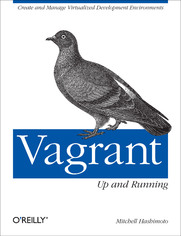Vagrant: Up and Running - Helion

ISBN: 978-14-493-3612-7
stron: 158, Format: ebook
Data wydania: 2013-05-30
Ksi─Ögarnia: Helion
Cena ksi─ů┼╝ki: 101,15 z┼é (poprzednio: 117,62 z┼é)
Oszczędzasz: 14% (-16,47 zł)
Discover why Vagrant is a must-have tool for thousands of developers and ops engineers. This hands-on guide shows you how to use this open source software to build a virtual machine for any purpose—including a completely sandboxed, fully provisioned development environment right on your desktop.
Vagrant creator Mitchell Hashimoto shows you how to share a virtual machine image with members of your team, set up a separate virtualization for each project, and package virtual machines for use by others. This book covers the V1 (1.0.x) configuration syntax running on top of a V2 (1.1+) core, the most stable configuration format running on the latest core.
- Build a simple virtual machine with just two commands and no configuration
- Create a development environment that closely resembles production
- Automate software installation and management with shell scripts, Chef, or Puppet
- Set up a network interface to access your virtual machine from any computer
- Use your own editor and browser to develop and test your applications
- Test complicated multi-machine clusters with a single Vagrantfile
- Change Vagrant’s default operating system to match your production OS
- Extend Vagrant features with plugins, including components you build yourself
Osoby które kupowały "Vagrant: Up and Running", wybierały także:
- Mastering DevOps in Kubernetes 84,60 zł, (71,91 zł -15%)
- Strategic DevOps 99,41 zł, (85,49 zł -14%)
- AWS Cloud Practitioner Exam Guide 99,41 zł, (85,49 zł -14%)
- Building Cloud and Virtualization Infrastructure 88,94 zł, (76,49 zł -14%)
- Hands-on Application Development using Spring Boot 88,94 zł, (76,49 zł -14%)
Spis tre┼Ťci
Vagrant: Up and Running eBook -- spis tre┼Ťci
- Vagrant: Up and Running
- Foreword
- Preface
- Conventions Used in This Book
- Using Code Examples
- Safari Books Online
- How to Contact Us
- Content Updates
- October 29, 2013
- Acknowledgments
- 1. An Introduction to Vagrant
- Why Vagrant?
- The Tao of Vagrant
- Alternatives to Vagrant
- Plain Desktop Virtualization
- Containers
- Cloud
- Vagrant Versions
- Setting Up Vagrant
- Installing VirtualBox
- Installing Vagrant
- Mac OS X
- Windows
- Linux
- Common Mistakes
- Improper PATH Configuration
- Conflicting RubyGems Installation
- Using Vagrant Without VirtualBox
- Help!
- 2. Your First Vagrant Machine
- Up and Running
- The Vagrantfile
- V1 versus V2 Configuration
- Boxes
- Up
- Working with the Vagrant Machine
- State of the Vagrant Machine
- SSH
- Shared Filesystem
- Basic Networking
- Teardown
- Suspend
- Halt
- Destroy
- Whats Next?
- 3. Provisioning Your Vagrant VM
- Why Automated Provisioning?
- Supported Provisioners
- Manually Setting Up Apache
- Automated Provisioner Basics
- Shell Scripts
- Chef
- Puppet
- Multiple Provisioners
- No Provision Mode
- In-Depth Provisioner Usage
- Shell Scripts
- Inline scripts
- Run-once scripts
- Chef Server
- Puppet
- Modules
- Hiera Data
- Custom Facts
- Using a Puppet Master
- Shell Scripts
- Whats Next?
- 4. Networking in Vagrant
- Forwarded Ports
- Pros and Cons
- Basic Usage
- Collision Detection and Correction
- TCP versus UDP
- Host-Only Networking
- Pros and Cons
- Basic Usage
- Guest Operating System Dependency
- Bridged Networking
- Pros and Cons
- Basic Usage
- Composing Networking Options
- NAT Requirement As the First Network Interface
- Whats Next?
- Forwarded Ports
- 5. Modeling Multimachine Clusters
- Running Multiple Virtual Machines
- Controlling Multiple Machines
- Communication Between Machines
- Host-Only Networks
- Bridged Networks
- Real Example: MySQL
- Whats Next?
- 6. Boxes
- Why Boxes?
- Box Format
- Basic Box Management with Vagrant
- Creating New Boxes from an Existing Environment
- Creating New Boxes from Scratch
- Creating the VirtualBox Machine
- Configuring the Operating System
- Installing VirtualBox Guest Additions
- Additional Software
- Minimizing the Final Box Size
- Packaging It Up
- Setting Vagrantfile Defaults
- Whats Next?
- 7. Extending Vagrant with Plug-Ins
- Extensible Features
- Managing Vagrant Plug-Ins
- Plug-In Development Basics
- Plug-In Definition
- Plug-In Components
- Error Handling
- Vagrant Internals
- A Basic Plug-In Development Environment
- Developing a Custom Command
- Component
- Implementation
- Working with the Virtual Machine
- Working with Multimachine Environments
- Parsing Command-Line Options
- Adding New Configuration Options
- Component
- Implementation
- Accessing the Configuration
- Configuration Merging
- Validation
- Adding a Custom Provisioner
- Component
- Implementation
- Provisioner Configuration
- Configuring the Machine
- Modifying Existing Vagrant Behavior
- Component
- Implementation
- Useful Keys in the Action Environment
- Learning More
- Other Plug-In Components
- Packaging the Plug-In
- A. Vagrant Environmental Variables
- VAGRANT_CWD
- VAGRANT_HOME
- VAGRANT_LOG
- VAGRANT_NO_PLUGINS
- VAGRANT_VAGRANTFILE
- B. Vagrant Configuration Reference
- C. Troubleshooting and Debugging
- IRC
- Mailing List/Google Group
- Professional Support
- Index
- About the Author
- Colophon
- Copyright





